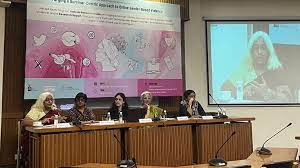The report delves into the issue of online gender-based violence (OGBV) in India and reveals how courts view cases of OGBV, flagging emerging concerns that need attention
Indian courts tend to treat cases involving online gender-based violence (OGBV) towards women as less severe than physical violence due to the misconception that online space is less real or tangible than the physical world, a research report by policy thinktank IT for Change has revealed.
Further, courts in India continue to be unfair and biased against survivors of online gender-based violence, particularly women, the report reveals.
While some court orders acknowledge the harm caused by online violence, courts often use language that is condescending and overly protective rather than focusing on the rights of the survivors, the report reveals.
The report titled 'The Judiciary's Tryst with Online Gender-Based Violence: An Empirical Analysis of Indian Cases and Prevalent Judicial Attitudes' was done with the support of the International Development Research Centre (IDRC), Canada and the Ford Foundation. The lead authors are Malavika Rajkumar and Shreeja Sen.
The report delves into the issue of OGBV in India and reveals how courts view such cases.
The study highlights that some of the laws in place, like those in the Indian Penal Code (IPC), use outdated and biased terms such as "outraging the modesty of a woman," which support traditional and unfair ideas about women in the courtroom.
Additionally, the study found that court orders frequently aim to "protect" women's honor and virtue from offensive comments online.
Some judgments even use the idea of women being sacred as a reason to shield them from harm.
Such approaches do not really protect the rights of the victims or survivors. Instead, they rely on old-fashioned ideas that limit women's independence and freedom.
Regarding the tendency to treat OGBV cases as less severe than physical violence, the study points out that the online and offline worlds are connected and actions online can lead to real harm and vice versa.
Further, it underscores that while some legal provisions like Section 66E of the Information Technology Act of 2000 and Section 509 of the Indian Penal Code address privacy concerns, the understanding of privacy in OGBV cases is often limited.
Expressions such as "sexual violence against women is an unlawful intrusion into the right to privacy and sanctity of a female" reflect this limited understanding, the study contends.
The study also points out that courts' reliance on Section 65B(4) Evidence Act certificates to authenticate electronic evidence can result in the exclusion of vital evidence in OGBV cases.
It highlights that in bail orders, courts often focus on the complainant's "character" rather than addressing the accused's alleged offence. Moreover, the absence of specific conditions in bail orders to address the online actions of the accused exacerbates the issue, the study finds.
Most OGBV cases happen on popular social media platforms like Facebook, Twitter, WhatsApp, and Instagram. Unfortunately, courts don't always recognize the role of these platforms in spreading harmful content that affects the victims.
As a way forwards, the study recommends that:
- Courts should take OGBV seriously, treating it as a serious harm to victims and recognizing that it can happen both online and offline. They should also handle cases that involve both online and offline actions appropriately.
- Courts should have clear and effective rules for dealing with situations where someone shares intimate or private content without consent online. They should follow established laws and protect people's privacy.
- OGBV victims' privacy should be safeguarded, and if current laws don't do that well enough, they should be improved with input from women's rights groups and society in general.
- Online platforms should be held responsible for harmful content, and there should be changes in policies and laws to make sure big digital companies take action against such content, even if it's profitable for them.
- Courts should make sure that they create a safe and fair environment for people from marginalized groups who are seeking justice. They should also consider power imbalances in relationships when making decisions.
- The process for proving that digital evidence is real should be made simpler, and court orders for releasing someone on bail should be adjusted to fit the online context.
- Everyone in the criminal justice system, including lawyers and police, should be more aware and sensitive when dealing with cases of online gender-based violence.
